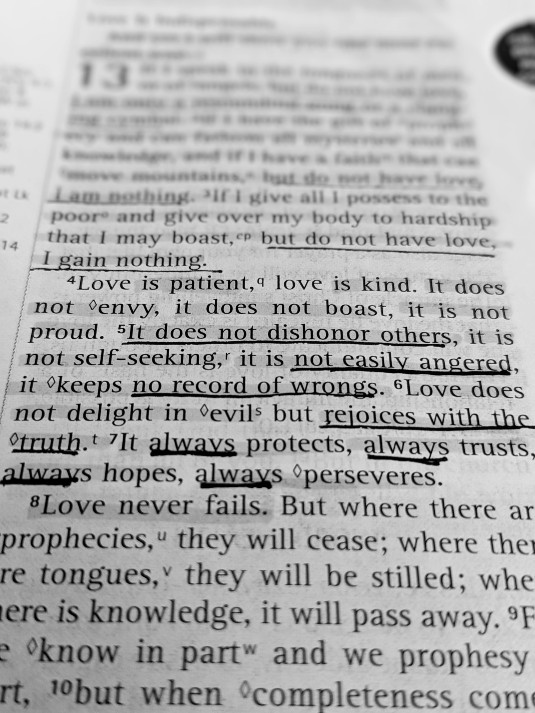There are times when we find ourselves talking with people who have different political beliefs than us. In fact, these conversations might be taking place as we stand in line to vote on this Election Day. We may find ourselves tempted to abandon civil conversation, but it is necessary to be intentional about remaining calm and kind at all times, even when a conversation is difficult. The Bible instructs Christians to act in a manner commendable before God and to live at peace with everyone. As the Bible instructs: “As I have loved you, so you must love one another.”
 Words carry many different meanings, and some of those meanings depend on situations in which they are used. How often do we stop to check what words we are saying and applying to people? Photo by Emma Tihen
Words carry many different meanings, and some of those meanings depend on situations in which they are used. How often do we stop to check what words we are saying and applying to people? Photo by Emma Tihen
__________________________________________________
In that one minute, someone can say so many words – words that encourage, build trust and foster relationships, or words which hurt, damage trust and fracture relationships. Christian pastor, theologian, author and apologist Timothy Keller said, “Tolerance isn’t about not having beliefs. It’s about how your beliefs lead you to treat people who disagree with you,” a quote found on MBU’s own Mabee Great Hall doors. We all have beliefs one way or another, and at some point, we’re going to encounter someone who does not share our beliefs. It can be very easy to spout off reckless words at someone with whom we disagree, but even in situations where others’ thoughts do not align with ours, being discourteous still is not an option since we are called by God to share uplifting words. Being uncivil to those with whom we disagree is the easy route – it’s a happy scenario of comfort where no one and nothing is challenged to change … a safe zone. But there is a war zone. While this war zone exists in a multitude of scenarios, its trenches are often found abruptly when we engage in political conversations with those we staunchly disagree with. In these situations, people may feel an array of emotions, from defensiveness to anger to sadness, and during these feelings we don’t always respond with calm words. Why don’t we? Even to those people we have nothing in common with, and share no common political beliefs, there is still an obligation to treat others justly. As Christians, God calls us to live at peace with everyone as far as it’s within our power … and it always is. It can be easy to pass the duty to someone else when irritated arguments occur, but it’s our job to see every person through Christ’s eyes … and that view is always from, through and in love. If our political beliefs differ from others, are we allowed to abandon the instructions God gives us for godly living so that we can make others agree with our political beliefs? Wouldn’t that be an exception? It seems so easy to allow for this exception, and often we convince ourselves that it’s so important for others to share our political beliefs that we disregard the higher responsibility to treat everyone with fairness and love. We reason ourselves into believing that because this person sees things differently from us, it’s important that they come to agree with us, so it should be fine to excuse ourselves from the way we ought to respond, no matter how many hurtful words fly uninhibited from our mouths. But this is not an exception to how we should treat others. There is never an exception allowing us to treat others differently than the way God gently and lovingly instructs us to. It’s during tough times, the times when others’ grounded beliefs differ from our own, that we must buckle down, carefully handle our feelings and remember that a person’s differing political beliefs do not make them our enemy. And no differences of opinions, no matter how big or small the topics, give us permission to combat someone for whom Christ died, just as He died for us all. The Bible instructs us in Titus 3:9 to avoid arguments about topics such as politics. “But avoid foolish controversies and … arguments and quarrels about the law, because these are unprofitable and useless.” Instead, in 2 Timothy 2:24, we are instructed to be kind and teach the public Jesus’ ways, rather than creating more hurt. “And the Lord’s servant must not be quarrelsome but must be kind to everyone, able to teach, not resentful.” When we intentionally see every person the way God sees them, we should automatically remember that although we may disagree on political beliefs there are so many more important things with which we should concern ourselves, particularly treating everyone the way God treats us and tells us to treat others. On this particular Election Day, and at all times, Christians should be concerning ourselves with the instructions to pursue mutual peace and love one another as God loves us. While it may be a challenging task, especially during times when we disagree with many people’s political beliefs and tempers may run high, our witness for the Lord may be found in our compassion, respect and love for others.